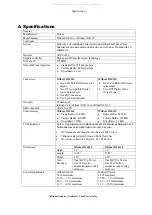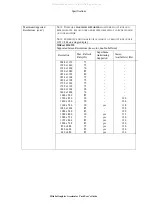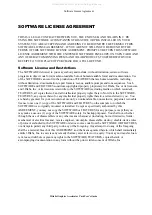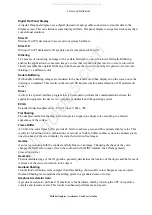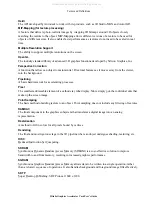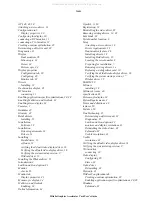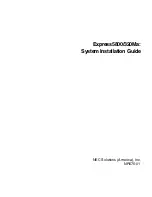
Terms and Definitions
3Dlabs Graphics Accelerator Card User's Guide
Stencil Buffer
Similar to stipple masking, the stencil buffer assists with the creation of transparent effects.
Stipple masking
A technique that spatially creates transparent effects by rendering an object through various patterns.
Streaming SIMD
An instruction set developed by Intel for Pentium -processor based systems. Streaming SIMD can
improve 3D vertex transformation and lighting, among other operations.
SuperScene Antialiasing
SuperScene antialiasing (
see Antialiasing
) is an enhanced version of multisampling and offers true,
multisampled, scene-based antialiasing of
all OpenGL
primitives in a scene. SuperScene Antialiasing is a
feature found only on Wildcat graphics accelerators.
SVGA
Super Video Graphics Array. SVGA runs at 800 x 600.
Tessellation
The initial part of the 3D pipeline where the object is described by a set of triangles.
Texture Mapping
A technique that enables 2D graphic images to be “wrapped” around or “pasted” on to a 3D primitive.
Perspective correction and lighting calculations allow for added realism.
Transformation
The change in rotation, size, position, and perspective of an object in 3D space.
Transparency
A function that refers to the rendering of transparent (non-opaque) objects. Transparency is generally
accomplished on a polygon rendering system using either screen-door transparency or alpha blending.
Vectors/second
Lines drawn per second.
VGA
Video Graphics Array. VGA runs at 640 x 480.
VHR
Very High Resolution. VHR runs at 1280 x 1024.
VRAM
Video Random Access Memory is an expensive, fast type of RAM that is used as display memory on
high-end graphics boards.
VRML
Virtual Reality Modeling
Language.
Z-Buffer
Also known as the Depth Buffer, the Z-Buffer is a region of memory containing the depth component of a
pixel. Used, for example, to eliminate hidden surfaces from the image.
All manuals and user guides at all-guides.com


